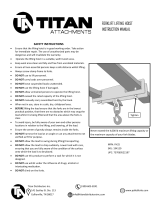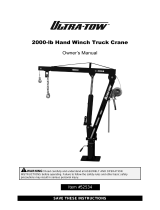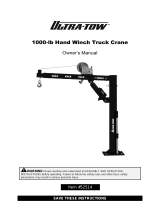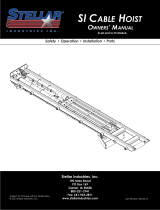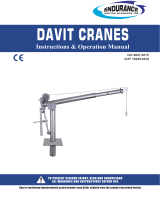Page is loading ...

TABLE OF CONTENTS Rev. 5/7/2021 PJ-LIFT, MANUAL
TABLE OF CONTENTS Copyright 2017 Vestil Manufacturing Corp. Page 1 of 8
PJ-LIFT PALLET TRUCK HOIST
INSTRUCTION MANUAL
Receiving Instructions
After delivery, remove the packaging from the product. Inspect the product closely to determine
whether it sustained damage during transport. If damage is discovered, record a complete description of
it on the bill of lading. If the product is undamaged, discard the packaging.
NOTE: The end-user is solely responsible for confirming that product design, use, and maintenance
comply with laws, regulations, codes, and mandatory standards applied where the product is used.
Technical Service & Replacement Parts
For answers to questions not addressed in these instructions and to order replacement parts, labels,
and accessories, call our Technical Service and Parts Department at (260) 665-7586. The Department
can also be contacted online at https://www.vestil.com/page-parts-request.php
.
Electronic Copies of Instruction Manuals
Additional copies of this instruction manual may be downloaded from
https://www.vestil.com/page-
manuals.php.
Vestil Manufacturing Corp.
2999 North Wayne Street, P.O. Box 507, Angola, IN 46703
Telephone: (260) 665-7586 -or- Toll Free (800) 348-0868
Fax: (260) 665-1339
Web: www.vestilmfg.com e-mail: info@vestil.com
Table of Contents
Page
Specifications…………………………………………………………………………………………..…..…
2
Signal Words………………………………………………………..……………………………………...…
3
Safety Instructions..……………………………………….………………………………..………………..
3
Record of Satisfactory Condition……………………………………………………………………………
3
Exploded View and Bill of Materials…………….………………………………………………………….
4
Installing/Mounting the Hoist………………………………………………………………………………..
5
Loading the Hoist……………………………………………………………………………………………..
6
Inspections & Maintenance………………………………………………………………………………….
6 – 7
Labeling Diagram…………………………………………………………………………………………….
7
Limited Warranty……………………………………………………………………………………………..
8

TABLE OF CONTENTS Rev. 5/7/2021 PJ-LIFT, MANUAL
TABLE OF CONTENTS Copyright 2017 Vestil Manufacturing Corp. Page 2 of 8
SPECIFICATIONS
Specifications for PJ-LIFT low lift truck-mounted hoists are provided on Vestil’s website. To access
the specifications document, navigate to this webpage: https://www.vestil.com/product.php?FID=1003
.
Click the “Specifications” tab. Scroll the page to the entry for the model you purchased, and click the
button in the PDF column that looks like a pencil inside a blue box. A PDF file will open. This file is the
specifications document. Print a copy of the document and keep it with your copy of this manual. The
following is an exemplar specifications document (28-007-271).

TABLE OF CONTENTS Rev. 5/7/2021 PJ-LIFT, MANUAL
TABLE OF CONTENTS Copyright 2017 Vestil Manufacturing Corp. Page 3 of 8
SIGNAL WORDS
This manual uses SIGNAL WORDS to indicate the likelihood of personal injuries, as well as the
probable seriousness of those injuries, if the product is misused in the ways described. The signal words
used in this manual appear below along with their definitions.
Identifies a hazardous situation which, if not avoided, WILL result in
DEATH or SERIOUS INJURY. Use of this signal word is limited to the
most extreme situations.
Identifies a hazardous situation which, if not avoided, COULD result in
DEATH or SERIOUS INJURY.
Indicates a hazardous situation which, if not avoided, COULD result in
MINOR or MODERATE injury.
Identifies practices likely to result in product/property damage, such as
operation that might damage the product.
SAFETY INSTRUCTIONS
Vestil strives to identify all foreseeable hazards associated with the use of its products. Material
handling is dangerous and no manual can address every conceivable risk. Ultimately, the most
effective way to prevent injury is to apply sound judgment whenever using this device.
WARNING
Risks of serious personal injuries arise from using this device.
• DO NOT use the crane until you read and understand the entire manual. Read the manual to
refresh your understanding of proper use and maintenance procedures whenever necessary. A copy of
this manual should be kept in a location that is accessible and known to all users of the truck.
• DO NOT use this product unless it is in SATISFACTORY CONDITION. Inspect the unit as directed in
INSPECTIONS & MAINTENANCE on p. 6-7. damaged or malfunctioning. Restore the crane to
SATISFACTORY CONDITION before returning it to service.
• DO NOT exceed the capacity: 500 pounds (227kg). See SPECIFICATIONS on p. 2. The weights of
the load, rigging, and all other equipment attached to the hoist must be added together to determine the
net weight applied to it. The net weight must not exceed the capacity.
• DO use the hoist only on even, level ground. DO NOT traverse sloped ground.
• DO lift the load only as high as necessary. Keep clear of the load while it is suspended. Lower the
load to rest on top of the fork tubes, or a pallet placed on the fork tubes, before moving the pallet truck.
• DO NOT use the hoist to pull or drag items. The hoist must only be used to lift items.
• ALWAYS load the hoist as recommended in LOADING THE HOIST on p. 6. Load swing can occur
unless the load is centered below the hoist hook. Load swing can result in serious injury and/or property
damage.
• DO NOT lift or transport people with the hoist. Only use the hoist as a material handling device.
• DO NOT use the hoist if any label is unreadable, damaged, or missing. See LABELING DIAGRAM on
p. 7. Contact the TECHNICAL SERVICE AND PARTS DEPARTMENT for replacement labels.
• DO NOT modify this device! Modifications automatically void the LIMITED WARRANTY on p. 8 and
might make the hoist unsafe to use.
RECORD OF SATISFACTORY CONDITION (THE “RECORD”)
Before putting the unit into service, make a detailed record of its condition. Include observations of
the winch assembly and cable, the hook, shackle and compression sleeve, pulleys, braces, wheels,
casters, caster release mechanisms (handles, brackets, tabs, slots), pivot points, welds, the frame
elements, and fasteners (bolts, nuts, washers, pins, etc.). Thoroughly photograph the unit from multiple
angles so that all features are clearly imaged. Photograph all labels applied to the product. Describe
where each label is located. Use the winch to extend and retract the cable. Describe the operation of
the winch. Collect all photographs and writings in a file. This file is a record of the product in satisfactory
condition. Compare the results of all inspections to the RECORD to determine whether the unit is in
satisfactory condition.
!

TABLE OF CONTENTS Rev. 5/7/2021 PJ-LIFT, MANUAL
TABLE OF CONTENTS Copyright 2017 Vestil Manufacturing Corp. Page 4 of 8
EXPLODED VIEW AND BILL OF MATERIALS
Item
Part no.
Description
Qty.
1
28-514-210
WELDMENT, ASSEMBLY
FRAME
1
2
65107
COTTER PIN, ZINC FINISH,
Ø5/32" X 2"
2
3
28-014-361
FRAME, FORK TUBE BRACE
2
4
11116
HHCS #2 Z PLATED, Ø3/8 x 3
1/4 LG
4
5
36106
HEX NUT, GRADE A, ZINC
PLATED, 3/8-16
3
6
21-042-002-
001
HAND WINCH, ONE PIECE
STRAIGHT HANDLE GRIP
1
7
11105
HEX BOLT, GRADE A, ZINC
PLATED, 3/8"-16 X 1"
3
8
33008
FLAT WASHER, LOW
CARBON, USS, ZINC
PLATED, 3/8"
7
9
28-112-040
CLEVIS PIN 1/2" x 2" lg.
2
10
99-027-005
PULLEY, 3/16" CABLE, 2 1/2"
OD, 1/2" ID
2
11
08-145-001
SPEC HDW, SWIVEL HOOK
2-TON
1
12
21-145-014
SPECIALTY HARDWARE,
Ø3/16" AIR CRAFT CABLE
1
13
21-145-013
SPECIALTY HARDWARE,
THIMBLE
1
14
37024
NYLON INSERT LOCK NUT,
GRADE 2, ZINC FINISH, 3/8"-
16
4
15
99-145-067
COMPRESSION SLEEVE
Ø3/16" X 1" LG
1

TABLE OF CONTENTS Rev. 5/7/2021 PJ-LIFT, MANUAL
TABLE OF CONTENTS Copyright 2017 Vestil Manufacturing Corp. Page 5 of 8
INSTALLING/MOUNTING THE HOIST
Only install the hoist on a low lift pallet truck in good condition. The truck must be able to easily support
the combined weight of the hoist, load rigging, and a full capacity load. See SPECIFICATIONS
on p. 2.
Step 1: Drive the pallet truck into the fork pockets of the hoist as shown (or lift the hoist and set it on
the forks).
Step 2: Attach braces to the fork tubes with
3
/
8
”-16 x 3” bolts and
3
/
8
”-16 hex nuts. Braces go under the
forks of the pallet truck. Tighten the nuts until braces press firmly against the forks. [NOTE: Pallet truck
not shown in diagrams to show the connections more clearly.]
Brace
3
/
8
”-16 x 3” hex bolt
3
/
8
”-16 hex nut
Brace

TABLE OF CONTENTS Rev. 5/7/2021 PJ-LIFT, MANUAL
TABLE OF CONTENTS Copyright 2017 Vestil Manufacturing Corp. Page 6 of 8
LOADING THE HOIST
1. Drive the pallet truck, with the hoist installed, into the fork channels of the skid supporting the load.
2. Apply appropriate rigging to the load.
3. Turn the winch handle counterclockwise to lower the load hook. Lower the hook so that the load rigging
can be attached to it. The center of the load should be directly below the hook to prevent load swing as it
rises off of the skid. The following diagrams illustrate proper and improper positioning.
Improperly positioned loads
5. Turn the winch handle clockwise to raise the load. Only raise the load a few inches above the skid.
6. Back the truck out of the skid and lower the load onto the fork pockets (of the hoist). If the load is too
narrow to rest on both pockets, place a pallet (or plywood) on the pockets.
7. Carefully move the truck to the unloading location. Raise the load. Remove the plywood/pellet. Drive
the pallet truck into the skid, and lower the load onto the skid. Disconnect the hook from the rigging.
INSPECTIONS & MAINTENANCE
Compare inspection results to the RECORD OF SATISFACTORY CONDITION. Do not continue to use
the product unless every component is in SATISFACTORY CONDITION. Cosmetic changes, like damaged
paint/powder coat do not constitute changes from satisfactory condition. However, touchup paint should be
applied to all affected areas as soon as damage occurs. Contact
TECHNICAL SERVICE to order
replacement parts. Contact information is provided on the cover page of this manual.
Inspect and maintain the unit as instructed and immediately after it sustains damage. Conduct a load test
of 125% of the rated capacity (1.25 x 500 pounds = 600 pounds) each time the crane is repaired. Raise
the test load for 1 minute. Return the lifter to the ground and unload it. Perform a Monthly Inspection
as
instructed on p. 7.
Side view
Front view
Hook/cable
aligned with
centerline of
load (red
dashed line)
Hook/cable
not aligned
with centerline
of load (red
dashed lines)
Side view
Front view

TABLE OF CONTENTS Rev. 5/7/2021 PJ-LIFT, MANUAL
TABLE OF CONTENTS Copyright 2017 Vestil Manufacturing Corp. Page 7 of 8
MONTHLY INSPECTIONS - At least once per month inspect:
1. Winch and pulleys: Cycle the hook up and down. Confirm
that the cable winds off of and onto the winch drum smoothly. The
winch brake should engage whenever the handle is still and
prevent the hook from lowering on its own. The cable pulley
should not be loose or severely worn and should rotate freely as
the cable passes over it.
2. Winch cable: Check for reeving, fraying, thinning,
birdcaging, and elongating regions. If the cable is damaged,
replace it.
3. Frame elements: Examine the fork tubes, braces, mast,
gussets, and boom for damage, corrosion, cracked welds, and
severe wear. All frame members should be square, rigid, and free
of significant rusting. Remove rust with steel wool or a metal
bristle brush, clean the areas to remove rust particles, and apply
touchup paint to the affected areas.
4. Hook: Visually inspect the hook before each use. Look for
deformations and cracks. Immediately discard the hook if it is
cracked or if the throat opening is more than 15% in excess of the
original throat opening. Discard the hook if it is twisted more than
10° from the plane of the hook in its original condition. Confirm
normal operation and operation of the safety latch. Examine cable
clamps that attach the hook to the cable. Make sure that all
connections are solid.
5. Fork tubes and braces: Inspect the fork tubes. Confirm that
both braces are securely attached to the tubes and solidly contact
the forks (of your pallet truck). Closely examine the areas around
the bolt holes in the braces and tubes. Look for elongations, rust,
corrosion, and metal fatigue. Check the condition of the hardware.
6. Labels: Confirm that all labels are in good condition and in
place as shown in the “Labeling Diagram” (below).
Every 6 months:
Conduct a load test. Lift a test weight equal to 125% of the capacity. After the test, examine the frame,
winch, cable, and hook. Look for deformations, cracks, and metal fatigue.
LABELING DIAGRAM
Label content and locations are subject to change so your product might not be labeled exactly as
shown. Compare this diagram to the RECORD
. If differences exist between the diagram and the
RECORD, contact TECHNICAL SERVICE. Replace all labels that are damaged, missing, or not easily
readable (e.g. faded). To order replacement labels, contact the technical service and parts department
online at
http://www.vestilmfg.com/parts_info.htm. Alternatively, you may request replacement parts and/or
service by calling (260) 665-7586 and asking the operator to connect you to the TECHNICAL SERVICE
AND PARTS DEPARTMENT.
A: Label 586
B: Label 1153
Mast
Hook
Cable
clamp
Cable
Boom
Winch
Fork tube
Brace
Gusset
Pulley
A
B

TABLE OF CONTENTS Rev. 5/7/2021 PJ-LIFT, MANUAL
TABLE OF CONTENTS Copyright 2017 Vestil Manufacturing Corp. Page 8 of 8
LIMITED WARRANTY
Vestil Manufacturing Corporation (“Vestil”) warrants this product to be free of defects in material and
workmanship during the warranty period. Our warranty obligation is to provide a replacement for a defective,
original part covered by the warranty after we receive a proper request from the Warrantee (you) for warranty
service.
Who may request service?
Only a warrantee may request service. You are a warrantee if you purchased the product from Vestil or from
an authorized distributor AND Vestil has been fully paid.
Definition of “original part”?
An original part is a part used to make the product as shipped to the Warrantee.
What is a “proper request”?
A request for warranty service is proper if Vestil receives: 1) a photocopy of the Customer Invoice that displays
the shipping date; AND 2) a written request for warranty service including your name and phone number. Send
requests by one of the following methods:
US Mail Fax Email
Vestil Manufacturing Corporation (260) 665-1339 [email protected]
2999 North Wayne Street, PO Box 507 Phone Enter “Warranty service request”
Angola, IN 46703 (260) 665-7586 in subject field.
In the written request, list the parts believed to be defective and include the address where replacements should
be delivered. After Vestil receives your request for warranty service, an authorized representative will contact you
to determine whether your claim is covered by the warranty. Before providing warranty service, Vestil will require
you to send the entire product, or just the defective part (or parts), to its facility in Angola, IN.
What is covered under the warranty?
The warranty covers defects in the following original, dynamic parts: motors, hydraulic pumps, motor
controllers, and cylinders. It also covers defects in original parts that wear under normal usage conditions
(“wearing parts”), such as bearings, hoses, wheels, seals, brushes, and batteries.
How long is the warranty period?
The warranty period for original dynamic components is 90 days. For wearing parts, the warranty period is 90
days. Both warranty periods begin on the date Vestil ships the product to the Warrantee. If the product was
purchased from an authorized distributor, the periods begin when the distributor ships the product. Vestil may, at
its sole discretion, extend a warranty period for products shipped from authorized distributors by up to 30 days to
account for shipping time.
If a defective part is covered by the warranty, what will Vestil do to correct the problem?
Vestil will provide an appropriate replacement for any covered part. An authorized representative of Vestil will
contact you to discuss your claim.
What is not covered by the warranty?
The Warrantee (you) are responsible for paying labor costs and freight costs to return the product to Vestil for
warranty service.
Events that automatically void this Limited Warranty.
• Misuse;
• Negligent assembly, installation, operation or repair;
• Installation/use in corrosive environments;
• Inadequate or improper maintenance;
• Damage sustained during shipping;
• Collisions or other accidents that damage the product;
• Unauthorized modifications: Do not modify the product IN ANY WAY without first receiving written authorization
from Vestil.
Do any other warranties apply to the product?
Vestil Manufacturing Corp. makes no other express warranties. All implied warranties are disclaimed to the extent
allowed by law. Any implied warranty not disclaimed is limited in scope to the terms of this Limited Warranty.
Vestil makes no warranty or representation that this product complies with any state or local design, performance,
or safety code or standard. Noncompliance with any such code or standard is not a defect in material or
workmanship.
/
